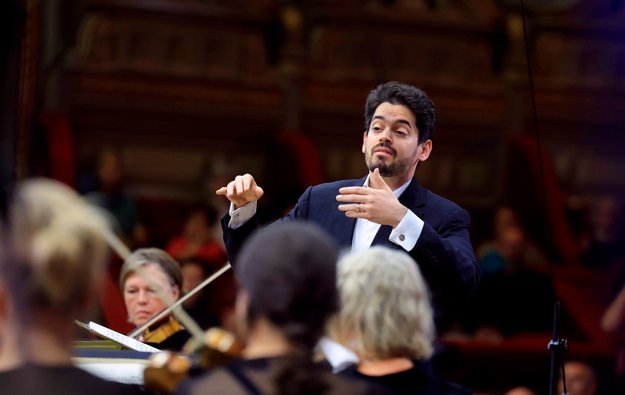
Berlin Hosts Shani After Belgian Festival Ban
Berlin steps in after Ghent cancels Lahav Shani, hosting the Munich Philharmonic in a solidarity concert for artistic freedom.
A Belgian classical music festival’s decision to cancel a concert because the conductor is Israeli has sparked an international outcry over antisemitism and artistic freedom. In response, organizers in Berlin have extended a spontaneous invitation for the orchestra and its Israeli conductor to perform there instead, in a show of solidarity and defiance against cultural boycotts.
Lahav Shani, the Israeli conductor at the center of the controversy, was disinvited from a Belgian festival concert – a move widely condemned as discriminatory.
Festival Cancels Concert Over Conductor’s Israeli Ties
Flanders Festival Ghent, an annual music festival in Belgium, abruptly canceled a September 18 performance by the Munich Philharmonic Orchestra, citing concerns about its conductor Lahav Shani’s connection to Israel. Shani, who was born in Tel Aviv and serves as music director of the Israel Philharmonic, was slated to lead the Munich Philharmonic in Ghent as its incoming chief conductor (he is set to officially take up the Munich post in the 2026/27 season timesofisrael.com). The festival’s organizers explained on their website that they were “unable to provide sufficient clarity” about Shani’s stance toward the Israeli government, referring to it as “the genocidal regime” in Israel theguardian.com. In light of Shani’s prominent role with the Israel Philharmonic, the festival said it chose “to refrain from collaboration with partners who have not distanced themselves unequivocally from that regime” – even while acknowledging that Shani had “spoken out in favor of peace and reconciliation” in the past timesofisrael.com
The Ghent festival framed its decision as being in line with calls within the local arts sector to boycott those insufficiently critical of Israel amid the ongoing war in Gaza theguardian.com. Festival officials suggested the presence of an Israeli artist of Shani’s stature could disrupt the “serenity” of the event given strong emotions surrounding the conflict timesofisrael.com. (Israel’s military campaign in Gaza following Hamas’s October 2023 attack has drawn both support and criticism across Europe, fueling intense public sentiment.) Shani himself has not made a public statement on the Ghent incident. However, prior to this controversy, he emphasized in interviews that while he is proud to represent Israeli culture, he views himself as an ambassador of the Israeli people and culture rather than of the government, and he has criticized some policies of Prime Minister Benjamin Netanyahu’s administration theguardian.com
Outrage and Accusations of Antisemitism
The cancellation provoked immediate and intense backlash in Germany, Israel, and even within Belgium. Critics slammed the festival’s move as blatant discrimination against an artist based on his nationality and an act of antisemitism under the guise of political principle. Ron Prosor, Israel’s ambassador to Germany, condemned the disinvitation as “pure antisemitism.” He noted that the festival welcomes musicians, visitors, and sponsors from all over the world, yet “the conductor from Israel is [being] disinvited – that is pure antisemitism” welt.de. Prosor said the organizers “could not have made it clearer that Jews are unwelcome there,” calling the episode “a frontal attack on the freedom of art hidden under the cloak of criticism of Israel.” welt.de
German officials also voiced anger. Wolfram Weimer, Germany’s Federal Commissioner for Culture and Media, denounced the Ghent festival’s decision as “a disgrace for Europe” and “naked antisemitism”, warning that it set a “dangerous precedent” by allowing politics to trump art theguardian.com. The German Embassy in Belgium responded by cutting ties with the Flanders Festival: it removed the embassy’s logo from the festival website and deleted promotions of the event from social media. The German ambassador in Brussels stated the festival’s decision and its justification were “incomprehensible.” welt.de
Belgian leaders, meanwhile, scrambled to contain the damage. Bart De Wever, the Prime Minister of Belgium, issued an unusually sharp rebuke of the festival. “Imposing a professional ban on someone solely because of their origin is both reckless and irresponsible,” De Wever wrote in a post on X (formerly Twitter) orf.at. He lamented that the controversy had “inflicted severe damage on the reputation of our country.” orf.at Prominent voices in Belgian politics across the spectrum echoed that sentiment – for example, Georges-Louis Bouchez, leader of one of Belgium’s liberal parties, called the cancellation “a disgrace” and suggested it smacked of political censorship tinged with antisemitism brusselstimes.com.
Jewish and Israeli organizations also criticized the move. The Israel Philharmonic Orchestra, Shani’s home ensemble, expressed “profound regret” and “firmly condemned” the festival’s decision, stating that “in the world of music and art, there is simply no place” for excluding someone “based on one’s place of origin.” timesofisrael.com Several cultural institutions in Europe likewise objected: the Berlin Philharmonic and Berlin State Opera released statements deploring the Ghent cancellation and affirming solidarity with Shani operawire.com.
Berlin Invites Disinvited Orchestra and Conductor
In a swift rejoinder to the controversy, Germany’s capital stepped in to support the disinvited orchestra. Musikfest Berlin – an ongoing classical music festival in the German capital – announced that it has invited the Munich Philharmonic and Lahav Shani for a special guest performance on September 15 at Berlin’s Konzerthaus operawire.com. This last-minute concert was arranged as a joint initiative of the Berliner Festspiele (which runs Musikfest) and the Berlin Philharmonic Foundation, in cooperation with the Konzerthaus venue operawire.com. The program will feature works by Beethoven and Wagner, and renowned Georgian violinist Lisa Batiashvili as soloist operawire.com – notably, Batiashvili was originally scheduled to solo in the canceled Ghent concert as well, so she too had been affected by the boycott.
Berlin’s cultural leaders cast the invitation as a powerful statement of principle. In a joint communication, the organizers said the concert is meant to send a signal “for the unifying power of art, the fundamental values of our democratic societies in Europe, and against antisemitism, discrimination and the boycott in art and science” orf.at. “In times when blatant Jew-hatred is increasingly erupting, this guest performance in Berlin is an important, sincere declaration of solidarity within the cultural scene,” added Culture Commissioner Wolfram Weimer domradio.de. According to Weimer, the Berlin invitation carries a clear message: we stand decisively against antisemitism and stand together for respect, humanity, and peaceful coexistence domradio.de. Germany’s Minister of State for Culture is also reportedly planning to attend the concert in person as a sign of support timesofisrael.com.
Berlin’s embrace of the Munich orchestra and Shani has been widely praised as a defiant rebuttal to the Belgian festival. “This is a wonderful signal,” Weimer said of the concert, emphasizing the unity of Europe’s arts community against exclusionary pressures domradio.de. Observers noted the historical resonance of Germany – a country deeply conscious of the dangers of antisemitism – taking a stand in this way. Munich’s Mayor Dieter Reiter and Bavaria’s Arts Minister Markus Blume likewise applauded the solidarity concert, with Blume calling the Ghent episode an “antisemitism scandal” and praising Berlin for not letting art become a casualty of geopolitics welt.de.
Artists and Cultural Figures React
Beyond government officials, many prominent artists and intellectuals have weighed in to condemn the Ghent festival’s action as antithetical to the freedom of art and academic exchange. Olaf Zimmermann, director of the German Cultural Council, remarked that forcing artists to declare loyalty for or against their country’s government amounts to an ideological “litmus test” that has no place in the arts domradio.de. “Artists are neither diplomats nor politicians – their realm is art,” Zimmermann said, arguing that demanding they publicly take a political stance in order to perform violates artistic freedom domradio.de. “What’s the next step?” he warned: “Should artists have to reveal whom they voted for to be allowed to appear on stage?” domradio.de
Meron Mendel, a Germany-based historian who was born in Israel, said a “red line” had been crossed with this boycott. “If [a decision] targets people because of their religion or nationality, that is extremely problematic,” Mendel commented, adding that “you cannot hold people [collectively] liable” for the actions of any state domradio.de. In his view, disinviting an individual artist due to his Israeli identity represents an unacceptable form of collective punishment.
Prominent classical musicians have also spoken out. Igor Levit, an acclaimed pianist and outspoken social commentator in Germany, said he was “angry and shaken” by Shani’s exclusion welt.de. In an interview with ARD’s Tagesthemen news program, Levit characterized the festival’s decision as a “collective punishment” of the entire Munich Philharmonic orchestra welt.de. He accused the festival organizers of caving in to public pressure and betraying their mission: “We constantly talk about the freedom of art. And now an institution like the festival in Ghent disinvites a German orchestra with its designated Israeli-Jewish chief conductor – solely because he is an Israeli Jew,” Levit said, “[that is] nothing less than capitulating to the mob on the street.” domradio.de Other orchestras have rallied behind Shani as well – for instance, the Berlin Radio Symphony Orchestra released a statement affirming that Shani has always stood for dialogue and peace, and declaring that music “which provides comfort and hope in an increasingly repressive world, must not become a victim of political boycotts.” domradio.de
A Stand for Artistic Freedom
The uproar over Lahav Shani’s barred concert in Ghent has evolved into a broader debate about cultural boycotts and antisemitism in Europe’s arts scene. The incident comes at a time of heightened tensions over the Israel-Gaza war, which has prompted calls in some quarters for boycotts of Israeli institutions. Yet the near-universal condemnation of the Belgian festival’s move – from German and Belgian officials, Israeli representatives, artists, and cultural organizations – underscores a widespread consensus that punishing an individual artist for his national origin is beyond the pale. Even Belgium’s own federal government distanced itself from the festival: Belgian Foreign Minister Maxime Prévot deemed the cancellation “excessive,” stressing “we must not confuse the Jewish community and Israelis with Netanyahu’s policies.” timesofisrael.com
As the Munich Philharmonic and Lahav Shani take the stage in Berlin on September 15, the event is being hailed as a victory for the principle that art should unite, not divide. Many see it as a rebuttal to intolerance and a reaffirmation that cultural exchange must transcend political conflict. “Culture must not become a pawn of geopolitical conflicts,” as one German state culture minister put it domradio.de. In the words of Ambassador Prosor, music should remain a place of connection and reconciliation – a sentiment now backed by the resounding chorus of support for Shani. The controversy that began in Ghent has thus sparked not only outrage, but also a moment of solidarity in Berlin, sending a clear message in Europe: discrimination has no place in the concert hall.
Sources: Flanders Festival Ghent’s public statement on canceling Lahav Shani’s concert theguardian.com timesofisrael.com Reporting on reactions from German, Israeli, and Belgian officials (Guardian theguardian.com; Times of Israel timesofisrael.com; Brussels Times brusselstimes.com) Comments from Israeli Ambassador Ron Prosor welt.de and Belgian PM Bart De Wever orf.at Musikfest Berlin’s invitation and statement of purpose orf.at domradio.de; OperaWire report on the Berlin concert program operawire.com Statements from cultural figures: Olaf Zimmermann domradio.de, Meron Mendel domradio.de , and pianist Igor Levit welt.de, as reported in German media (Domradio, Welt, ARD)






